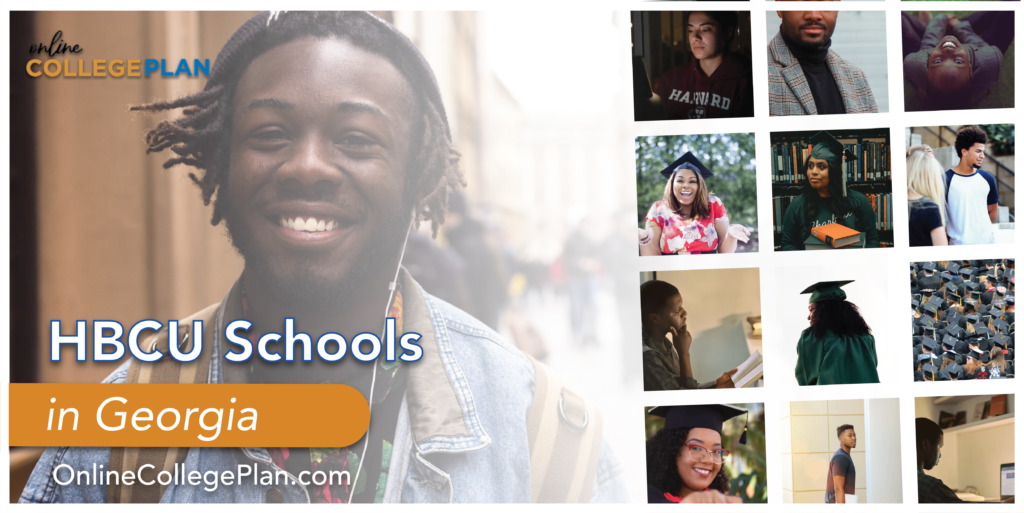HBCU IN GEORGIA
Find your degree

There are hundreds of colleges in Georgia, but not all are HBCUs (Historically Black Colleges and Universities). Prospective students looking for a Georgia HBCU will be pleased to know that there are many higher education options to choose from.
Many of the HBCUs in Georgia are excellent schools. In fact, several are considered among the best online HBCU colleges in the nation. This article will help you sort out the best HBCU colleges in Georgia for you.
Our editors first published HBCUs in Georgia in June 2023. This ranking was updated February 2024.
Attending one of the best HBCU colleges within your state of residence has advantages, including:
- Affordability: Georgia HBCU schools (especially public colleges) offer great tuition rates for in-state students.
- Accessibility: Being able to travel to your campus easily will allow you to meet with other students and professors.
- Opportunity: The best HBCU colleges have working relationships with local companies and employers, which gives students more opportunities for high-quality internships and job placement.
Many of the best HBCU colleges started in southern American states after the Civil War to provide Black students with quality educational opportunities without discrimination. As a result, many HBCUs in Georgia are well known to their local communities, giving graduates stable and lucrative employment opportunities after graduating. This article will provide you with some helpful information on the best HBCU colleges in Georgia.
10 Best HBCU Colleges and Universities in Georgia
| School | Location | In-state Tuition | Acceptance Rate |
| Albany State University | Albany, Georgia | $5,934 | 100% (open admission) |
| Fort Valley State University | Fort Valley, Georgia | $5,832 | 43% |
| Savannah State University | Savannah, Georgia | $5,498 | 100% (open admission) |
| Clark Atlanta University | Atlanta, Georgia | $24,730 | 56% |
| Interdenominational Theological Center | Atlanta, Georgia | $14,000 | N/A |
| Morehouse College | Atlanta, Georgia | $29,468 | 60% |
| Morehouse School of Medicine | Atlanta, Georgia | $23,513 | N/A |
| Morris Brown College | Atlanta, Georgia | $9,558 | 100% (open admission) |
| Paine College | Augusta, Georgia | $14,596 | 52% |
| Spelman College | Atlanta, Georgia | $28,885 | 28% |
Albany State University
Our first HBCU in Georgia, Albany State University, is one of the best HBCU colleges in the state. This public university offers a larger online catalog of courses and degrees than other HBCUs in the state. It is accredited by the Southern Association of Colleges and Schools Commission on Colleges.
Tuition for in-state students (undergrads) is $5,934. The school is small, with an undergraduate enrollment of just over 5,800 students. The current acceptance rate is around 73 percent.
Some of the most popular majors include Nursing, Business, and Liberal Arts. Around 28% of the students graduate. While the graduation rate may seem low, students stay connected. The alumni network is a viable resource for many graduates.
Pros
- Diverse program and course selections
- Low in-state tuition for Georgia residents
- Online degree pathways
- Open admission
- Small city campus setting with access to metro areas
Cons
- Low graduation rate of 28%
Fort Valley State University
Founded in 1895, Fort Valley State University is a public university that offers a wide range of bachelor’s programs, plus master’s degrees in education and counseling. Located in the Macon area of Georgia, with a relatively small undergraduate enrollment of around 2,300, it it one of the best HBCU colleges in the state.
But to get in is a challenge, as the acceptance rate is 43%. However, tuition is low for in-state students. Undergrads pay $5,832/year. So, if you’re looking for an affordable Georgia HBCU, it’s worth applying.
The school has an athletic accreditation of NCAA Division 2, and they have a variety of sports teams at the university, including football. In addition, the school has some of the best student dormitories in the country. Popular majors include Family Studies, Psychology, and Consumer Sciences.
Pros
- Access to bachelor’s, master’s, and certificate programs
- Diverse selection of majors and courses
- Low in-state tuition for Georgia residents
- Small student population (2,360 undergraduates)
Cons
- Lower acceptance rate than other HBCUs (43%)
Savannah State University
Founded in 1890, Savannah State University is the oldest HBCU public university in the state of Georgia. It is well known for its prestigious science and engineering degrees, though the school offers a number of programs across various disciplines. The undergraduate enrollment is 2,740 students.
Tuition for in-state students at SSU is $5,498. While the school offers open admission, you will still need to prove your abilities. A 3.0 GPA is the minimum requirement for acceptance.
Student life at Savannah State is lively outside of the classroom, and Savannah is also well known for its Greek Life. Some of the most popular majors include Journalism, Biology, and Liberal Arts.
Pros
- Access to Savannah culture and nightlife
- Affordable in-state tuition for Georgia residents
- Small campus environment
- Open admission
Cons
- Higher out-of-state tuition for non-residents of Georgia
Clark Atlanta University
Formed in 1988 with the consolidation of Clark College and Atlanta University (both of which were founded in the 1860s), Clark Atlanta University is a private Historically Black University that offers over 40 degrees at the bachelor’s, master’s, and doctoral levels. Tuition is $24,730 for both in-state and out-of-state students.
The school is great for those looking for HBCU colleges in Atlanta since you’ll have plenty of connections in the city. Plus, the university is right in the heart of downtown. CAU has an undergraduate enrollment of around 3,400, making it a small yet tight-knit student community. The admission rate of CAU is 56%, making it a bit more competitive than some of the other college options on this list.
Around 46% of students who attend CAU graduate. Some of the most popular majors include Criminal Justice, Radio and Television, and Business.
Pros
- Access to Atlanta area businesses and culture
- Diverse selection of programs and courses
- Generous financial aid awards
- Located in the heart of the Civil Rights Movement
- Small, tight-knit student community
Cons
- More competitive for admissions than other colleges (56% acceptance rate)
Interdenominational Theological Center
The Interdenominational Theological Center is a graduate HBCU located within Clark Atlanta University in Atlanta, Georgia. Since the center is situated in CAU, you have the added benefit of getting your master’s degree in the heart of the city. Tuition at this HBCU school is $14,000.
The undergraduate enrollment at the theological center, is under 200 students, making this Georgia university a tight-knit community. There are only a few programs of study at the Interdenominational Theological Center. Some of the most popular ones are Theological Center & Divinity and Pre-Theology & Religious Vocations.
Pros
- Access to Atlanta businesses, nightlife, and culture
- Low cost graduate degree programs
- Small, tight-knit student community
Cons
- Limited number of program offerings
- No undergraduate programs available
- Small student population of 193
Morehouse College
Founded in 1867, Morehouse College is a private, all-male HBCU located in Atlanta. It was the alma mater of Dr. Martin Luther King Jr. The college is renowned for its academic quality, as it is one of two Historically Black Colleges and Universities to produce Rhodes scholars.
Tuition at Morehouse College is $29,468, although about 90% of students receive some form of financial assistance. In addition, Morehouse admits around 60%, making it moderately easy for students to get in. The student body is just over 2,500.
Fifty-nine percent of students who attend Morehouse go on to graduate. Some of the most popular majors at Morehouse College include Biology, Business, and Political Science.
Pros
- Access to Atlanta area businesses and culture
- Diverse selection of undergraduate degrees and courses
- Generous financial aid assistance and awards
- Low student-to-faculty ratio of 10:1
Cons
- More selective than other colleges
- Small, all-male student body
Morehouse School of Medicine
The Morehouse School of Medicine is a graduate HBCU within Morehouse College that focuses explicitly on medical studies. It is a graduate school, with only around 890 students.
There are six different graduate programs offered at the Morehouse School of Medicine, but the most popular ones include Public Health and Medical Science. The MSM, as it is commonly abbreviated, employs 250 faculty and staff members, and the ratio of students to faculty is nearly 2:1.
Many of the nearly 1,400 alumni of MSM choose to serve underprivileged communities using their medical degree knowledge. In addition, many alumni are distinguished leaders who have been recognized in Georgia as well as internationally.
Pros
- Access to Atlanta area medical facilities and laboratories
- Ideal for students interested in public health and medical sciences
- Low student-to-faculty ratio of 2:1
- Research opportunities
- Small, tight-knit student community
Cons
- Limited number of degree programs and offerings
Morris Brown College
Morris Brown College, another HBCU in Atlanta, is one of the smallest schools on the list with about 250 students. Morris Brown is a closely connected community with several unique majors, including Global Management, Applied Leadership ESports, and Organizational Management.
More than half of its enrolled student body is from Georgia, but students come from all over the country to experience the small class sizes and southern HBCU life. In addition, MBC’s tuition is $9,558 before financial aid, so the school is affordable to attend for most students. Many students enrolled receive some form of financial aid assistance.
Pros
- Access to Atlanta area business, culture, and nightlife
- Approved for international student enrollment
- Diverse selection of program and course offerings
- Low student-to-faculty ratio of 14:1
- Small class sizes
Cons
- No graduate degree offerings
- Very small student population (253 students)
Paine College
Paine College is a private HBCU located in Augusta, Georgia. The college is closely affiliated with both the United Methodist Church and Christian Methodist Episcopal Church.
The average cost of attendance is $14,596 per year, and the school has an acceptance rate of 52%. However, 18% of the students who attend Paine end up graduating from there.
Some of the values of Paine College include academic excellence, social responsibility, spirituality, and personal development. The most popular programs of study at Paine include Sociology, Criminology, and Social Psychology.
Pros
- Diverse selection of courses and programs
- Low student-to-faculty ratio (10:1)
- Small, tight-knit student community
Cons
- Low graduation rate of 18%
- More selective than most schools (52% acceptance rate)
- No graduate programs
Spelman College
Spelman College is another one of the HBCU colleges Atlanta has to offer. And not only is it one of the best Historically Black Colleges and Universities in the state, but also a historically women’s only college. Spelman is an exceptional university to attend as a Black woman because of its outstanding programs and incredibly high graduation rate.
About 74% of students who attend Spelman end up graduating from the school, and the college has an average tuition rate of $28,885.
You’ll need to be above average when it comes to grades to attend Spelman, as students who are accepted have an average GPA of around 3.76. Spelman prides itself on being a school designed for driven young women, and the student body and alumni certainly reflect this.
Pros
- Dedicated to academic excellence in the arts and sciences
- Diverse selection of programs (over 30)
- Low student-to-faculty ratio of 11:1
- Picturesque campus in the heart of Atlanta
- Recognized as a top Black Ivy League school
Cons
- Higher tuition than some other HBCUs in Georgia
Frequently Asked Questions
An HBCU is a Historically Black College or University. These universities were initially established to help African American students achieve a high-quality secondary education. HBCUs do admit students of all races, but they primarily admit Black students. They exist all over the country, but are mostly found in southern states like Georgia.
Attending a Historically Black College or University (HBCU) can offer an enriching educational experience for various reasons. Here’s a list of some potential benefits that will help you figure out if an HBCU in Georgia is right for you.
• Academic excellence and strong programs
• Cultural awareness and diverse perspectives
• Financial assistance from scholarships and grants
• Leadership development opportunities
• Networking opportunities through alumni
• Social activism and community engagement
• Supportive environment with smaller class sizes
No. Although many African American students attend the school, Georgia State is part of the university system and a large public research college. It is not an HBCU.
Savannah State University is the oldest HBCU public university in the state of Georgia. Founded in 1890, SSU is a four-year institution that serves 2,740 undergraduate students. It ranks #51 among top HBCUs by U.S. News and World Report.
The National Center for Education Statistics reports acceptance rates for HBCUs and other schools. In Georgia, here are the easiest ones to get into.
• Albany State University (open admission)
• Savanna State University (open admission)
• Morris Brown College (open admission)
• Morehouse College (60% acceptance rate)
Related Articles:
Top 20 Best Historically Black HBCU Colleges with Online Programs
Where can I find an HBCU in Maryland?
Can I attend a HBCU in Virginia and take some of my courses online?



